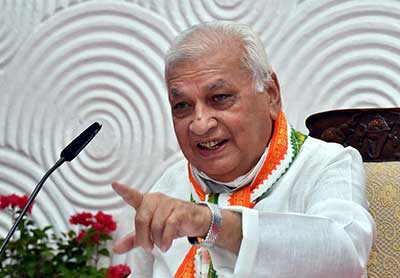Date: 20/10/2022
Relevance: GS-2: Functions and Responsibilities of the Union and the States, Issues and Challenges Pertaining to the Federal Structure
Key Phrases: Kerala University Laws (Amendment) Bill, 2022, Article 164 of the Constitution, the pleasure of the Governor, M.M. Punchhi Commission, Centre-State relations, withdrawal of pleasure.
Why in News?
- Kerala Governor recently warned ministers that the statements of individual ministers that lower the dignity of the Governor’s office can invite action including withdrawal of pleasure.
Context of the issue:
- The context for this particular confrontation appears to be the Governor’s reluctance to grant assent to the Kerala University Laws (Amendment) Bill, 2022.
- Kerala’s Higher Education Minister’s remark that the Governor should return the Bill for reconsideration instead of withholding his approval indefinitely was a possible trigger for his comment.
Article 164 of the Constitution:
- It says the Chief Minister shall be appointed by the Governor and other Ministers shall be appointed by the Governor on the Chief Minister’s advice, adding that “the Ministers shall hold office during the pleasure of the Governor”.
What does the “pleasure” of the Governor mean?
- This does not mean the Governor has the right to dismiss the Chief Minister or ministers at will.
- The pleasure doctrine exists only in a constitutional sense and is exercised by the Governor only on the advice of the Chief Minister.
- In other words, the term ‘pleasure of the Governor’ is used as a euphemism to refer to the Chief Minister’s power to drop a Minister from the Council of Ministers.
- If the government enjoys a majority in the House, the Governor cannot say that he withdraws his pleasure.
- The Governor’s pleasure continues in the Constitutional sense as long as the government enjoys a majority in the House.
- Thus, the pleasure of the Governor is co-terminus with the majority in the House.
- The Punchhi Committee recommended deleting the “Doctrine of Pleasure” from the Constitution but backed the right of the Governor to sanction the prosecution of ministers against the state government’s advice
Supreme Court’s opinion:
- The Supreme Court had on many occasions held that a government that enjoys a majority in the House cannot be dismissed by the Governor.
- In Shamsher Singh & Anr vs State Of Punjab (1974), a seven-judge Constitution Bench of the Supreme Court said that the President and Governor, custodians of all executive and other powers under various Articles, shall exercise their formal constitutional powers only upon and in accordance with the advice of their Ministers save in a few well known exceptional situations.
- In Nabam Rebia And Etc. vs Deputy Speaker And Ors (2016) the Supreme Court cited the observations of B R Ambedkar: “The Governor under the Constitution has no function which he can discharge by himself; no functions at all. While he has no functions, he has certain duties to perform, and I think the House will do well to bear in mind this distinction.”
Governor’s role as Chancellor:
- In the realm of university laws, Governors, being Chancellors of most universities, the scope for friction is quite high.
- The office of the Chancellor is created by the statute that establishes a university, and the legislature is equally competent to curtail the Chancellor’s powers or even abolish the system of having the Governor as Chancellor.
- Even the M.M. Punchhi Commission, which reviewed Centre-State relations, recommended that Governors should not be burdened with the role of Chancellors. It is time to implement this principle.
Conclusion:
- Sometimes the Governors seem to have an exaggerated notion of their roles under the Constitution.
- Governors may differ with the contents of a Bill and may exercise the available constitutional options; they should not use their powers to stall legislation they don't like.
- They are expected to defend the Constitution and may use their powers to caution elected regimes against violating the Constitution, but this does not mean that they can use the absence of a time frame for decision-making and the discretionary space given to them to function as a parallel power centre.
Source: The Hindu
Mains Question:
Q. What role does the Governor play in the parliamentary system? What attempts have been made to address concerns over the alleged partisan role played by Governors? Discuss.








